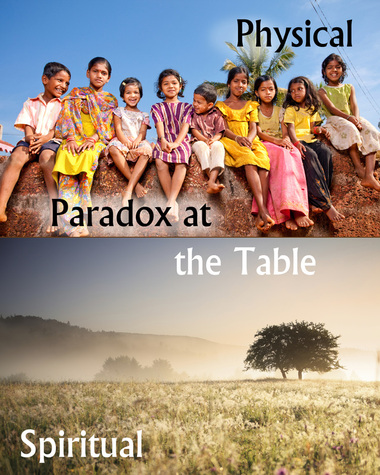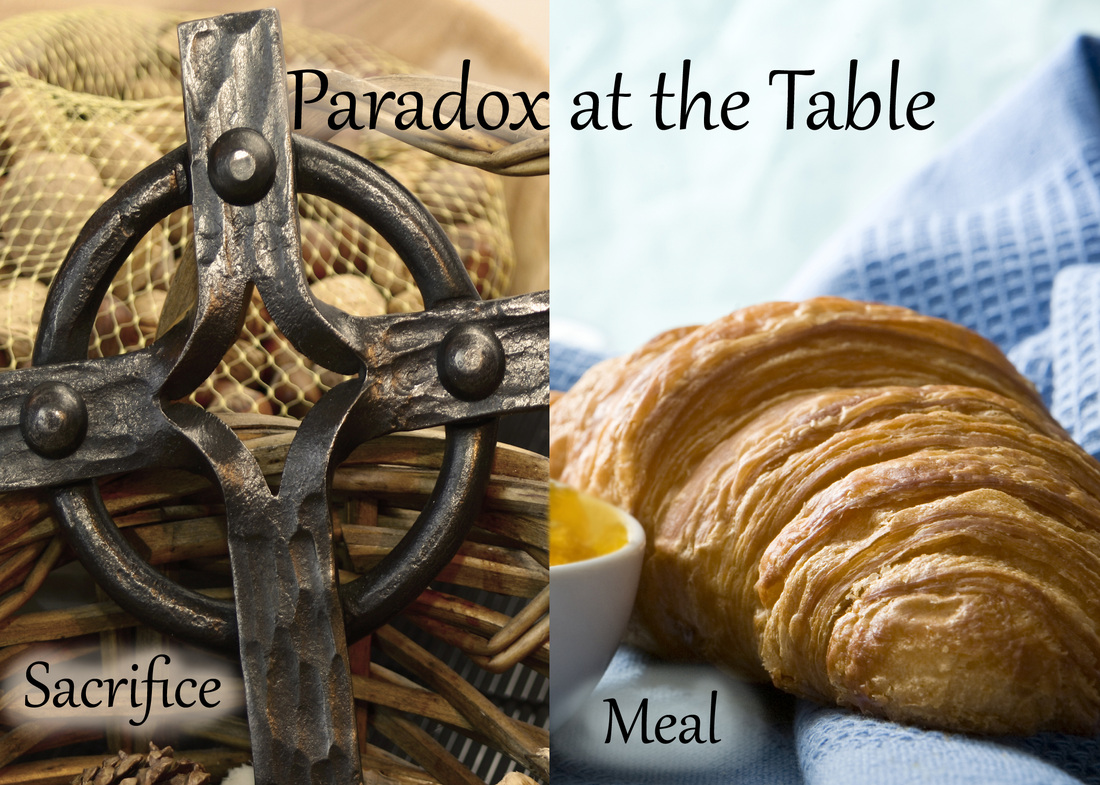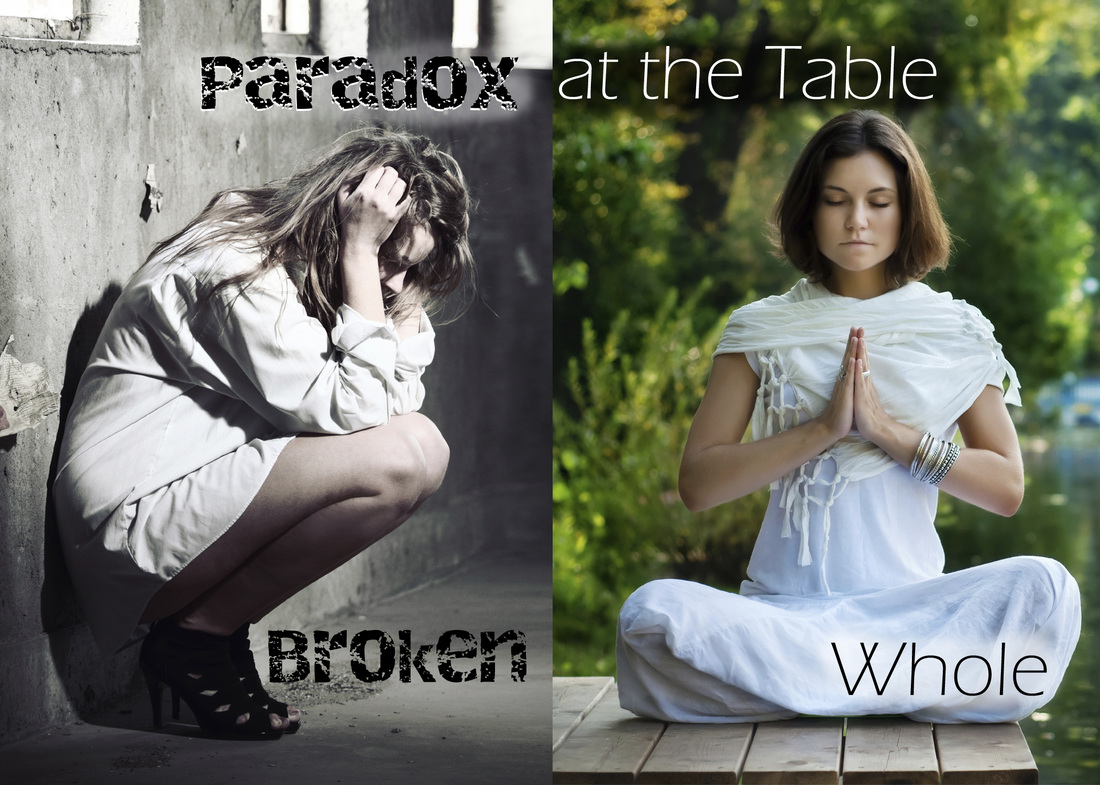(This meditation is the last in a series regarding the communion table) The bible is a collection of certain letters and books put together to create a canon. Basically, early in the Christian story there were tons of letters and books different local churches collected and used. Some of them were really good and some of them were complete frauds. A group of early Christians got together and picked the ones they considered authentic. While there are those who might argue for or against some of the books included or excluded, for the most part they did a good job. This is why, when you open up your bible to the New Testament the first four books basically tell the same story. (This would be Matthew, Mark, Luke, and John.) The reason these early Christian Fathers chose four of the same story is simple and I will explain. Eye witness accounts are always more reliable when there are more than one set of eyes to share the account. It is like the Gospel writers are the witnesses giving testimony to the event. They are not all the same because each writer has their own perspective, but they are all important.
This impacts our theme for the table because both the Gospel of Matthew and Gospel Luke share one of Jesus' sermons. Their account, as it is with the writings of eye witnesses, vary in some subtle but important ways. In Luke, the need is physical. As we need to eat to survive in this world so the Gospel of Luke recalls Jesus saying that God blesses the poor because their richness is in the God's kingdom. The need is with those who cry and hunger physically. The Gospel of Matthew, on the other hand, shows Jesus focusing on the spiritual need. The focus is on grief, obedience, mercy, humility and peace. At the table our soul needs to be fed as much as our stomach. Jesus played in both the physical and spiritual world. He physically ate and drank with people, fed people and healed people. He spiritually ate and drank with people, fed people and healed people. He was completely concerned about the body and the soul. (This meditation is the fourth of a series regarding the communion table) This meditation was influenced by Chapter 8 of Sunday Dinner by William Willimon. It is a great, easy to read book on Communion.
Perhaps there appears to be a contradiction of the table being a sacrifice and a meal, but this apparent contradiction is the easiest to understand. Once I explain it you will see how genius Jesus was using a meal as one of the greatest symbols of the Christian faith. Each and every time we eat we are participating in a sacrifice and a meal. Let's say you and I are going to sit down and eat a fried chicken dinner. On the table is a huge bowl of mashed potatoes, a heaping portion of homemade macaroni and cheese, and good ole' buttermilk biscuits. Of course in the middle of table, smelling up the entire room, is crispy and greasy fried chicken. (I hope your mouth is watering because mine is.) Before a bite even comes to your mouth sacrifice is all over the table. First there is the sacrifice of life. The chicken's life had to be sacrificed in order to make the meal. The future life of eggs had to be sacrificed to make the biscuits and possibly the coating for the chicken. (Depending on how it was done.) The cow gives up the milk and butter. The grain is destroyed to make the flour. Sacrifice. Second, time was sacrificed to make the meal. Americans tend to take time for granted. Even frozen fried chicken purchased at the grocery store takes time to make. As the saying goes, time is money. Perhaps we don't consider what we do as part of the sacrifice of the table, but we should. Every time we come to the table for communion we are taking our joys and sorrows; our successes and failures with us. It is not bad to take sorrows and failures to the table as long as we realize we are bringing those things. Jesus made failure at the table an option when he brought up Peter's and Judas' failure before they had ever done it. Judas ran away from it while Peter did the correct thing and confronted it. None of that discounts this is meal, a celebration. We gather. We commune. (There is a reason we call this communion.) I believe there is no better way to connect than over a meal. I must confess, I enjoyed the meals at the leadership conference, I recently participated in, because I talked more over food. Aside from my cohort group, every meaningful connection I made was during a meal. Food puts our guard down and allows us to find the most primal of connections: we all need to eat. No wonder Jesus ate with anyone who would take him in: tax collectors, Jews, Gentiles, Priests, Lawyers, friends, enemies, and complete strangers. Another way to look at it: The table is all about give and take. Sacrifice is what is given to the table. Jesus gave the ultimate sacrifice. We also bring our sacrifice to it. The meal is what we take from the table. Without both give and take the table breaks and ceases to function. Next week we will wrap it all up: How do we understand the table both being a spiritual and a physical meal? (This meditation is the third of a series regarding the communion table) The health of the table appears to be a paradox. We are called to wholeness, and at the same time called to brokenness.
The bread is broken. Paul tells the Corinthians that we are all part of the Body of Christ. Need we not forget, Jesus, at the communion table lifts the bread and says, "This is my body broken for you." Wellness is usually follows a path of first being broken. Consider healthy brokenness. When a bone in the body heals incorrectly it must be re-broken in order to be reset. In the same way there comes times when our soul heals incorrectly and it too must be broken again to be reset and heal correctly. Take Jonah for example. As a prophet, someone who is told to tell the people something and they do, Jonah didn't want to listen. God put him in the belly of a big fish and after he was suitably broken he did what was right. When light is needed right away a light stick has a tube of glass in it separating two chemicals. When the glass inside is broken the two liquids mix together creating light. In the same way there comes times when people can break through barriers to connect with those we haven't been able to before, allowing God's light to shine. Jesus broke barriers all the time and usually at a meal. He ate with Jewish leaders, tax collectors, Gentiles, the good, the bad and the multitude. The cup is whole. Throughout the text of communion the cup remains whole and connected. We, as participants are asked to take from it, but the cup never breaks. Jesus gave us many images of wholeness. My favorite is the parable of the sheep. If a shepherd has 100 sheep and loses one, would he not go out and find the one? (The answer is yes. The shepherd would go out and find the one, because God wants wholeness.) My second favorite is the prodigal son, a story about a son who leaves the parent only to discover everything he really needs is home. The parent welcomes the child back with loving and open arms, just as God welcomes us back when we turn away. Just like brokenness, wholeness can hurt. From the perspective of the 99 sheep or the son who stayed home, it can be difficult to see God's reasoning for wanting complete redemption and not just the "faithful." (Yes, I put that in quotations for a reason.) The Christian Church (Disciples of Christ) believes in an open table. All are invited to participate in communion. For me this is just an obvious truth. It is not I or any other person who invites people to the table. It is God who sends the invitations, we are just the party hosts. Humanity is not in control. We pretend we have control. We attempt to take the reins, but our attempts are false. Just as it is not a church or a group of people who have and will employ me. God is my employer. It is the people who are in the accounting department. We may own the wood or metal used to make the communion table. Someone might have bought the bread and juice. The table clothe might have been donated by a modern saint of the church, but God is the ultimate owner of it all. Next Week: How can we resolve how the table as both a sacrifice and a meal? |
Categories
All
Archives
October 2023
|






 RSS Feed
RSS Feed